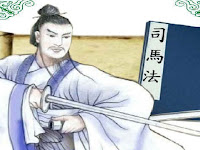Better
sweat in practice than bleed in battle (Wǔ Shù wisdom)
 The combats
and strategies were a constant topic through the human history. In China only
there are seven important military texts. First is from worldwide well-known Sun
Zǐ, (The Art of War), the next are from general Wèi Liáozi (The Art of War),
Wú Qǐ (The Art of War),
Sīmǎ Fǎ (The Marshal's Art of War or The
Methods of the Sīmǎ Fǎ), the legendary figure Jiāng Zǐyá (Six Secret Teachings), general Zhang Liang (The Three Strategies of Huáng Shígōng), and finally: Questions and
Replies between emperor Táng Tàizōng and general Lǐ Wèi Gōng. The texts were practically canonized
under the name “The Seven Military Classics” already in 11th century,
and were later on included in most military encyclopedias. In military spheres
it was as important as Confucius’s work is for the bureaucrats.
The combats
and strategies were a constant topic through the human history. In China only
there are seven important military texts. First is from worldwide well-known Sun
Zǐ, (The Art of War), the next are from general Wèi Liáozi (The Art of War),
Wú Qǐ (The Art of War),
Sīmǎ Fǎ (The Marshal's Art of War or The
Methods of the Sīmǎ Fǎ), the legendary figure Jiāng Zǐyá (Six Secret Teachings), general Zhang Liang (The Three Strategies of Huáng Shígōng), and finally: Questions and
Replies between emperor Táng Tàizōng and general Lǐ Wèi Gōng. The texts were practically canonized
under the name “The Seven Military Classics” already in 11th century,
and were later on included in most military encyclopedias. In military spheres
it was as important as Confucius’s work is for the bureaucrats.Better spend three years looking for a good master than ten years training with a bad one (Wǔ Shù wisdom)
In China a
philosophy does not come only from the country’s rich culture but also from
martial arts. The keystone in Chinese philosophy is a strong humanism that became
a focus of numerous Chinese philosophers throughout the ages. This humanism
does not imply exclusion or indifference to a supreme powers and the nature.
Instead, the general conclusion goes towards the unity of human and ‘heaven.’
This spirit of synthesis has characterized the entire history of Chinese
philosophy.
 A range of
similarly motivated philosophical doctrines is covered by Daoism. Two great
philosophical systems of China stand alongside: Daoism and Confucianism. Somehow
less influential and less important to the development of Chinese culture are ‘the
School of Mo’ and ‘the School of law’. The latter was a utilitarian political
philosophy that did not address higher questions like the nature and the purpose
of life. Both of them evolved at about the same time as Confucianism and Daoism during the
‘Spring and Autumn Period’ (770–476 before our era), and ‘Warring States
Period.’
A range of
similarly motivated philosophical doctrines is covered by Daoism. Two great
philosophical systems of China stand alongside: Daoism and Confucianism. Somehow
less influential and less important to the development of Chinese culture are ‘the
School of Mo’ and ‘the School of law’. The latter was a utilitarian political
philosophy that did not address higher questions like the nature and the purpose
of life. Both of them evolved at about the same time as Confucianism and Daoism during the
‘Spring and Autumn Period’ (770–476 before our era), and ‘Warring States
Period.’










